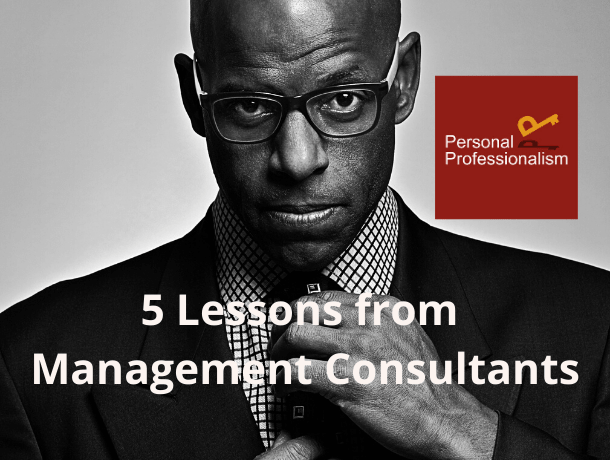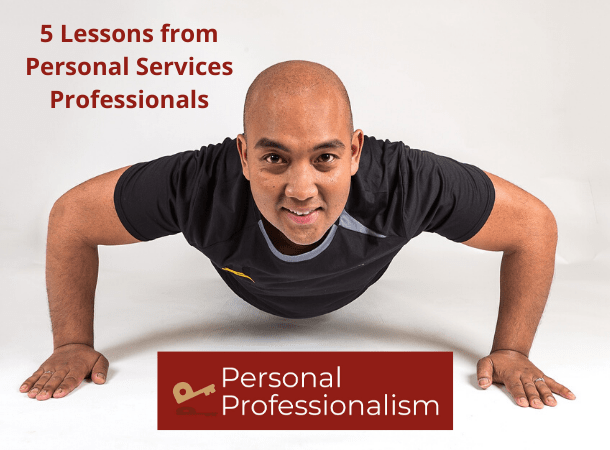Five top professionalism tips from Management Consultants that you can apply today!

What challenges the personal professionalism of Management Consultants?
Management Consultants (MC) advise their clients in areas from strategy to operational improvements, to the introduction of new technologies and generally fixing clients’ problems. This means that MCs usually have valuable, expert knowledge or possess mastery over a set of specialist skills.
They almost always work on a project or programme basis, knowing that they will work only temporarily on any one project or with any one client.
What are the challenges to the personal professionalism of people who are Management Consultants, how do they address them, and what can people in other occupations learn from them?
1. Skills and Knowledge – staying on top
“Our trade is expert knowledge,” says Christine, “if our clients already have the same knowledge and skill-level, then we’re not valuable at all”.
This usually means that her knowledge is far in advance of that of her clients. It means that the level of mastery over her knowledge is almost artistic – it is something that she possesses that satisfies her clients’ needs but almost defies articulation.
Christine’s challenge is to ensure that her knowledge is both relevant and sufficiently deep to distinguish her from her clients’ own staff as well as from competitors. She needs to be able to see far enough ahead to ensure that the market doesn’t change without her awareness, rendering her knowledge value-less.
“If we don’t have that, we can’t charge a premium fee. Our business model would only be to be an additional resource (contractor) when our client needs extra people temporarily and that’s a different market that’s highly competitive, and not nearly as intellectually stimulating to the very clever people we employ”.
The lesson for anyone in any role is to ensure that they possess the right knowledge to the right depth and be able to apply it for their client’s benefit. It follows that one must be vigilant and sensitive to changes in knowledge to keep on top.
A true professional takes the time to invest in knowledge and skills. From labourers to CEOs, they will quickly be out of a job if they do not possess valuable knowledge.
The investment can be from reading papers and websites with developments in their industry, to engaging with peers and colleagues in the same industry all the way through to formal training and even graduate education.
MCs take care to participate in workshops, seminars, briefings from industry and governments. They develop trusted support groups where they share their own knowledge, skills and tools trusting that they will be able to gather information from those support groups when they need it.
The essence is to make sure that the knowledge is relevant, up-to-date and valuable in the marketplace for your skills.
2. Do Experts Know Everything?
Angus asks “if you are not perceived to be ‘an expert’, why would they pay $200 an hour for your services?”
This does not mean that you need to know everything, nor have every answer.
It does mean that you need to know how to find out an answer!
MCs in large consultancies have the ‘luxury’ of ongoing training, practice groups and networks of colleagues and 24/7 knowledge databases. Sole-trading MCs usually started out in large consultancies and have established social networks to support them.
A reasonable client will understand that, when you do not immediately have answer, you will need to seek the answers from your networks or knowledge databases. The true professional will be able to source, understand and be able to use that knowledge effectively and efficiently for the benefit of their client.
It’s ok not to know. However, it’s neither ok nor professional not to know how to find out!
The lesson for anyone in any role is that you have to be comfortable to say that you don’t know. Says Alice, an MC in healthcare, many MCs “find this too hard as they are used to being the ‘expert’.
Alice feels that “the biggest challenge for my role is being comfortable with my own vulnerability when facilitating” workshops and training courses.
The sentence “I don’t know right now, but I can find out” is one of the most valuable in the management consultancy toolbox.
3. Genuinely Trusted
This naturally leads to the challenge of trust.
Angus tells me that “there is the challenge of “becoming the trusted consultant, not the untrusted contractor. The engagement becomes much more productive for both sides if the consultant can achieve this trust.”
This can take a long, long time to develop. Over time, it requires consistent delivery against expectations to any required standards, especially those of time and quality.
It also required consistently correct advice, even if the MC does not know immediately and has to take time go away to get that correct advice.
Setting realistic expectations
Angus believes that building trust starts at the beginning of any engagement.
“I have seen people oversell capability by significant margins and it never ends well for anyone” says Angus.
Trust is an ethical issue and the primary ethical challenge is to set realistic expectations for what can be done and what the MC can do. There is a balance to be achieved in being “perceived as sufficiently knowledgeable to add value whilst maintaining ethics.”
Demonstrating knowledge without actually knowing the answer
A good MC is a well-prepared MC. They are well-briefed on their project and have undertaken their own detailed research regarding the client, their context (such as their competitive environment), their aims and their needs.
This means that when an MC is asked a question but does not know the answer, they can still demonstrate their knowledge in a number of ways:
- By demonstrating that they understand the question; that they are ‘on their game’ as Angus puts it. They will work to understanding the real meaning of the question including any nuance or detail and will distinguish between what the client says they want and what they actually need
- By asking intelligent, clarifying questions – a simple and respectful ‘why?’ goes a long way
- By helping the client frame the question appropriately – the MC is there to do something that the client is unable to do themselves, and so their questions might be clumsy or incomplete. A good MC will guide them towards posing an answerable question
Truth and transparency
Trust also comes from ‘telling it straight’. This can mean setting out both the good and the problematic implications of the MCs advice.
It can require a lot of bravery!
Archie is an Organisation Design specialist MC. He tells me that “I think a big professional challenge is how to design roles that are meaningful and flexible enough for someone’s career development and progression, while still satisfying the top-down requirements to deliver a specific part of the business”.
However, many ICT “roles are linked to specific customer contracts or products or technologies, and would be closed if contracts are lost or products retired. Roles are rarely hand-crafted for an individual over time. A role can be designed perfectly to meet organisation requirements and career expectations of the role-holders, however the role might not exist if a customer contract ends”
He continues: “Good career planning and workforce management is key here but there isn’t always a fairytale ending. The professionalism challenge is to keep the employee aware that their role might never be completely decoupled from those overarching contracts or products. There may not be endless flexibility to reshape the role for their next career step.”
As a lesson to anyone, it pays to be active about building trust. Take the opportunity to point out that you have delivered outcomes or advice as expected.
Don’t assume it is automatically noticed. Find a way to communicate it. For example, does your client respond to you ‘putting it out there’ such as seems to be appropriate in the North American context; or you might choose to make your point in a more subtle and self-effacing yet unambiguous way that tends to work in the British context.
4. Client-site Working
MCs often work in their clients’ own sites. This means that there is commonly a distance from colleagues and peers who work on their own clients’ sites.
The challenge to the professionalism of MCs is to find a balance in the need to develop relationships with clients while maintaining a clear personal brand of being a trusted external professional.
There is a temptation to start acting like an employee of your client. This can embed you in the social network of the client which can be valuable, but it can also make it more difficult to be seen as an external advisor. It means that, even if you are doing your job, it can give the appearance that you have become ‘just another’ employee (not to denigrate employees, it’s just that you are not one); it can reduce expectations of you so that the client wonders why they’re paying for you.
Your skills can flatten. If you are in the same place and not being challenged, your skills may deteriorate and stagnate. This might be ok in the short term but it means that you are less valuable to your client and to your employer. If skills and knowledge are your trade and your skills and knowledge are the same as everyone elses, then your value reduces.
In the eyes of your peers and colleagues, you may even start to lose the social traction of being a colleague with valuable insights. They may like and respect you, but you might lose that ‘external angle’ that informs your experience and therefore your value to colleagues. If you have nothing new to add, you can very suddenly find yourself pushed to the edge of social networks.
There are ways to overcome these significant challenges.
While on client site, develop relationships and trust by delivering expectations, but ensure that you are contextually separate. Typically, MCs dress ‘one level of formality’ above the prevailing culture of their clients. If clients wear smart casual dress in the office, an MC will wear business casual. If client-side people wear ‘business casual’, the MC might wear something closer to ‘business formal’; perhaps a suit and tie or dress-suit.
MCs must continually invest in time in the head office with colleagues. This has the double effect of being away from client site (and therefore not being ‘part of the furniture’) and being seen by colleagues, peers and bosses.
There is value in reporting beyond requirements; this means that there is value not only in formal reporting, but also developing the habit of letting your bosses know of progress, but also in the reflection it brings you – an active approach to ensuring that you are meeting your client’s needs (not wants).
5. Managing Scope, Being Professional about Favours
The project-based work of MCs means that there is always a scope and clearly defined outcomes and deliverables. There may even be defined methods, depending on the type of engagement.
A major challenge to the professionalism of MCs is changes or tests to scope.
For example, what if the client asks you to do something outside of scope? Or what if the scope is no longer relevant, such as due to changes in the industry, technology or legislation?
If a client asks you to ‘do a little extra’, the temptation is to do it; to do that ‘something’ the client wants you to do, even if it falls out of scope and if no payment is involved.
The challenge is clearly a professional one, being both ethical and commercial in nature.
It may be ethical because the client is asking you to provide something of value ‘off the books’, outside the scope and therefore the visibility of your employer.
It may be commercial because you are not being compensated for work being done. If you do decide that, it should be for a reason, and with the express agreement of colleagues responsible for the commercial relationship. Doing ‘extra’ could even undermine the commercial relationship. It could compromise you legally and ethically by doing something for which you will be held responsible but for which you will not be compensated nor protected either under contract or even tort law – and potentially even tax!
How to deal with it?
As usual, it depends on the situation. The underpinning thing to think about is ‘purpose and work-role’. Scope itself should be extremely clear, so any uncertainty should not be about whether something is in or out of scope, only what to do if work is not in scope either because you were asked to do it, or if the work ‘creeps’ outside of the scope.
The implication is that you need to be extremely clear about what the scope is, not only in the letter of the law/contract, but also the practical implications of the scope – what in and out of scope looks like.
Work you are asked to do: refer it to the person/people who manage the commercial aspects of the contract. If that’s you, then you need to consider if it makes commercial sense.
The client. Saying ‘no’, nicely. It’s unlikely that you will ever say ‘no’ directly to a request. It will be far more common that you will advise the client that you will need to take time to consider the request.
Be open about the fact that it’s not something you can agree to immediately (don’t have to mention that you don’t have authority); that you need to: continue what you are doing so as to keep to schedule as per the agreement that does exist. That will ‘buy time’.






